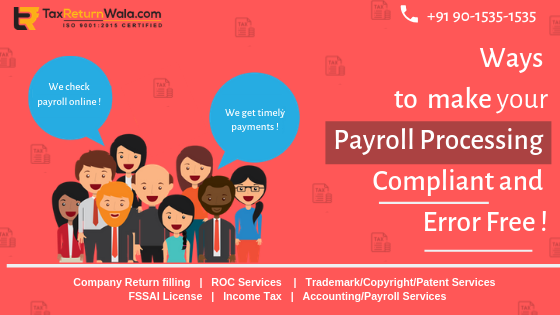Ways to Make Your Payroll Process Compliant & Error Free
No matter how big or small the organization is – Payroll management is one of the most tiring and crucial functions performed by HR Management Team of any business concern. It puts require efforts of the entire HR team or can be outsourced to an agency for payroll management to work and report for the right compensation payable to employees and to find their actual working hours, bonuses, provident funds, medical allowances, leaves and about certain deductions to be made out of their income.
What is Payroll Processing?
Payroll is the total amount of wages paid by a company to its employees associated either as a direct employee or linked with the organizations in one or the other way (as a freelancer or as contractors). Payroll processing involves the performance of numerous functions required to estimate the right amount
of salary to be paid to the employees after making certain deductions and fulfilling other legal obligations. It is prepared, managed or reported either weekly, monthly, quarterly or for any specified period.
Currently, Payroll processing in India is performed by :
>An HR / HR Management team of the organization.
> An accountant /bookkeeper /tax professional hired.
> An Outsourced payroll management agency.
> Using automated options like payroll software.
Previously, payroll management was a manual task which was of too much paperwork and handling of statutory documents. Even most of the organizations found that difficult for preparing their payrolls with rightly following of legal compliances associated with terms of employment contracts and government obligations. Now, with development in technology, payroll management is more convenient and accessible.
Preparing payrolls, cheques and managing payroll in-house is a much challenging task for both small and big organizations. While much-sophisticated tools and software in the industry are available for managing payroll, one can even think of improving their current payroll processing system either by hiring a professional payroll manager or by undertaking the any of following options:
- To Define a Clear Payroll Policy
Ensure your payroll policy is clear to everyone and is concise & up to the point. It should clearly mention the following:
– payment made to employees
– About reimbursement of expenses.
– Paid / Non paid leaves
– Commissions
– Part-time /full-time pay etc.
Try to move your payroll policy to an online system where it is easily accessible and convenient and well explained to your employees.
- Classify your Staff and Workers
It is essential for management to know who ‘s an outperformer and who are lacking. Thus, it is necessary to classify your workers among different categories/subcategories like part-time, full-time workers, commission based, temporary, etc. Without proper classification, a negative reaction from a different class of workers might have to be faced by the organization.
- Define a Budget
Framing a payroll budget will help you estimate departments/ offices which are overstaffed or understaffed and the adjustments needed. It will certainly bring out a definite plan for the management of wages- as a large portion of the budget defines the payment of wages, the rest can be prepared to estimate the amount of taxes/benefits to be paid or deductions to be made by the organization.
- Access to payroll information
Employees at different intervals ask for their previous payroll records, deductions made or for the payroll policy. Answering to each one of them would become very time-consuming. Thus, it is advisable to provide access to the payroll information to the employees through online means.
- Try to establish consistency in payments
It is advisable to stick to a common payday to each type of employee whether hired on a monthly salary or on an hourly basis. Placing a consistent payment schedule will further pace up things in order.
- Do Direct Deposits
Try to go paper-free and get appreciated from your employees by knowing them their payday and making their payment directly to their bank accounts. This will further reduce the time spotted for printing cheques and pay allocation.
- Automate time tracking and make use of technology
Automating time tracking of employees builds up accuracy in record making and saves the time of management. Even by a small business entity, a systematic record for entrance, exit, break hours, working hours, overtime, other schedules can be maintained by using time tracking tools like finger punching machine, etc.
- Try to present consolidated information
Ensure that you keep all your payroll records at a single centralized location where they can be easily accessed. This will help to get saved from the last minute call by any inspection officer and will bring peace of mind.
- Setup Reminders
Keep your payroll details updated and be particular to update your payroll records timely. Try to prepare your payroll calendar and match it with necessary financial deadlines like related to filling of taxes, deductions of PF and TDS, etc.
- Better to outsource
Even in highly developed institutions, the management lacks in managing payroll in-house. Outsourcing of your payroll streamline your business processes and build accuracy in your pay records professionally. Also, outsourcing payroll processing brings the advantage of the experience of agency professionals and accuracy of their specialized software which means instead of wasting time on payroll training of managers, keeps both cost and time under control of management.
Knowledge and practice build expertise!
Seeking for an experienced payroll manager for your business?
Let’s connect: info@taxreturnwala.com


